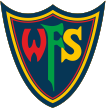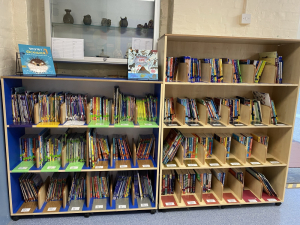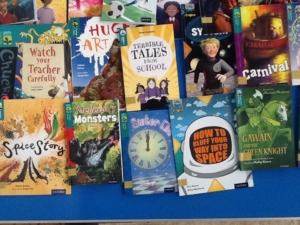Intent
We want all children to have the skills necessary to be excellent writers. Attention is paid to developing grammar, spelling and punctuation through the delivery of well-planned, rigorously monitored lessons. These always incorporate both modelled and shared writing to demonstrate to the children the thought processes and skills necessary to be an effective writer. End of unit independent writing, meeting varying genres, allows children the chance to refine their editing skills. Children often self and peer assess and help each other to re-draft and improve their work.
Reading is so developmentally important and we believe reading is key to unlocking all potential in English. We believe good writers are keen readers because reading helps develop an ideas bank on which they can draw upon when writing. Whole class reading takes place every week to develop children’s comprehension skills. Every class utilises their class readers to promote enjoyment of reading, vocabulary and to explore themes within books.
For those children who need extra support with their reading, we follow Project X CODE. Project X CODE is an innovative reading intervention programme, which combines systematic synthetic phonics, comprehension development, motivational 3D design and gripping stories to accelerate struggling readers’ progress so that children reach expected literacy levels as soon as possible. For those children who need additional phonics support, we follow the Twinkl programme, which is validated by the DfE and is a Systematic, Synthetic Phonics programme.
We want our pupils to become articulate and confident young people and therefore we present children with frequent opportunities to develop these skills through talking partner work, class discussions, sharing work and active listening.
Reading
-
Every class has a Class Reader which is read to the class by the teacher.
-
Every child completes four sessions of reading a week. The focus of these lessons is to encourage the children to work independently from a text at their level and to answer questions from this text. Another session is to work from an age-related text (with support from the teacher) before answering questions. An adult will go through the text with the class, modelling where to find the answers.
-
If your child has any gaps in their phonics, they will attend Codebreaker sessions (4xweek), which will be carried out in the autumn term.
-
If your child needs more support with their reading and understanding texts, then they will attend Code X sessions (4x week).
-
The library is open daily and children will also have a weekly class slot.
-
Reading Ambassadors carry out ‘Buddy Reading’ and support some children with reading their book.
-
Children will be listened to 1:1 by an adult.
Pupil Voice
Reading Scheme
In Field Junior School, we have invested in a variety of new books on our whole school reading scheme, which ensure that the children have a range of genres to choose from in every colour band that they are reading. The bands run from Purple band (level 8) all the way up to Cream (level 18) and in each band, there are fiction, non-fiction and poetry titles. We have just invested in more of the Gold Shimmer band books (level 16). We hope that the children enjoy choosing from these new titles!
- Reading strategies bookmark (129.66KB)
- English Curriculum Year 3 (162.93KB)
- English Curriculum Year 4 (159.65KB)
- English Curriculum Year 5 (166.55KB)
- English Curriculum Year 6 (173.18KB)
- Grammar Helper (469.98KB)
- Writing Helper (4.83MB)
- Reading Helper (6.20MB)
- Recommended Reading Books (315.57KB)
- A Year 3 Writer (206.64KB)
- A Year 4 Writer (209.05KB)
- A Year 5 Writer (552.19KB)
- A Year 6 Writer (554.29KB)


